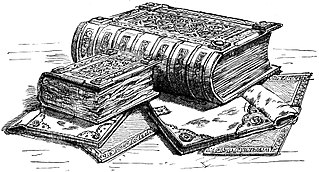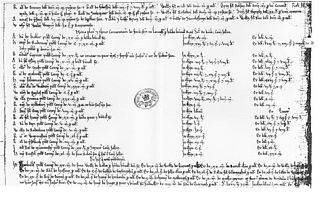Related Research Articles
Year 1177 (MCLXXVII) was a common year starting on Saturday of the Julian calendar.

Domesday Book is a manuscript record of the Great Survey of much of England and parts of Wales completed in 1086 at the behest of King William the Conqueror. The manuscript was originally known by the Latin name Liber de Wintonia, meaning "Book of Winchester", where it was originally kept in the royal treasury. The Anglo-Saxon Chronicle states that in 1085 the king sent his agents to survey every shire in England, to list his holdings and dues owed to him.
Benedict, sometimes known as Benedictus Abbas, was abbot of Peterborough. His name was formerly erroneously associated with the Gesta Henrici Regis Secundi and Gesta Regis Ricardi, English 12th-century chronicles, which are now attributed to Roger of Howden.

In the civil service of the United Kingdom, His Majesty's Exchequer, or just the Exchequer, is the accounting process of central government and the government's current account in the Consolidated Fund. The term is used in various financial documents, including the latest departmental and agency annual accounts.
The Dialogue on Translation between a Lord and a Clerk, or Dialogus inter dominum et clericum, was written by John Trevisa. Along with the dedicatory Epistle, it forms the introduction to his 1387 translation of the Polychronicon of Ranulf Higden, commissioned by Trevisa's patron, Lord Berkeley. Written in Middle English, it consists of a series of arguments made by the clerk on why books should not be translated from learned languages such as Latin, each one followed by a rebuttal from the lord. The clerk eventually agrees, and the exchange concludes with a prayer for guidance in the translation.

The Pipe rolls, sometimes called the Great rolls or the Great Rolls of the Pipe, are a collection of financial records maintained by the English Exchequer, or Treasury, and its successors, as well as the Exchequer of Ireland. The earliest date from the 12th century, and the series extends, mostly complete, from then until 1833. They form the oldest continuous series of records concerning English governance kept by the English, British, Irish and United Kingdom governments, covering a span of about 700 years. The early medieval ones are especially useful for historical study, as they are some of the earliest financial records available from the Middle Ages. A similar set of records was developed for Normandy, which was ruled by the English kings from 1066 to 1205, but the Norman Pipe rolls have not survived in a continuous series like the English.
Richard FitzNeal was a churchman and bureaucrat in the service of Henry II of England.

Nigel was an Anglo-Norman clergyman and administrator who served as Bishop of Ely from 1133 to 1169. He came from an ecclesiastical family; his uncle Roger of Salisbury was a bishop and government minister for King Henry I, and other relatives also held offices in the English Church and government. Nigel owed his advancement to his uncle, as did Nigel's probable brother Alexander, who like Nigel was advanced to episcopal status. Nigel was educated on the continent before becoming a royal administrator. He served as Treasurer of England under King Henry, before being appointed to the see, or bishopric, of Ely in 1133. His tenure was marked by conflicts with the monks of his cathedral chapter, who believed that Nigel kept income for himself that should properly have gone to them.
Events from the 1170s in England.
The Constitutio domus regis, was a handbook written around 1136 that discussed the running of the household of King Henry I of England, as it was in the last years of Henry's reign. It was probably written for the new king, Stephen. It gives what every officer and member of the household should be paid, what other allowances they should be given, as well as listing all offices in the household. It is likely that the author of the work was Nigel who was treasurer under Henry I and became Bishop of Ely in 1133, although this is not accepted by all historians.

Felix Liebermann was a Jewish German historian, who is celebrated for his scholarly contributions to the study of medieval English history, particularly that of Anglo-Saxon and Anglo-Norman law.
Thomas Madox was a legal antiquary and historian, known for his publication and discussion of medieval records and charters; and in particular for his History of the Exchequer, tracing the administration and records of that branch of the state from the Norman Conquest to the time of Edward II. It became a standard work for the study of English medieval history. He held the office of historiographer royal from 1708 until his death.
The Red Book of the Exchequer is a 13th-century manuscript compilation of precedents and office memoranda of the English Exchequer. It contains additional entries and annotations down to the 18th century. It is now held at The National Archives, Kew, London. It takes its name from its red leather binding, which distinguishes it from the related and contemporary, but smaller, Black Book of the Exchequer.

The Book of Fees is the colloquial title of a modern edition, transcript, rearrangement and enhancement of the medieval Liber Feodorum which is a listing of feudal landholdings or fief, compiled in about 1302, but from earlier records, for the use of the English Exchequer. Originally in two volumes of parchment, the Liber Feodorum is a collection of about 500 written brief notes made between 1198 and 1292 concerning fiefs held in capite or in-chief, that is to say directly from the Crown.

A Dialogue Concerning Oratorical Partitions is a rhetorical treatise, written by Cicero. According to the method of the Middle Academy, the treatise is sometimes described as a "catechism of rhetoric," for it is presented in the form of questions and answers. Cicero wrote it as a handbook for his young son, Marcus, and structured the text as a dialogue between the two of them.
Nicholas de Sigillo was a medieval Anglo-Norman administrator and clergyman in England. Perhaps beginning his career as a royal official during the reign of King Stephen of England, he had certainly entered royal service by 1157 when he was serving Stephen's successor King Henry II, and was a witness on a number of royal charters from 1157 to 1159.
Reginald de Warenne was an Anglo-Norman nobleman and royal official. The third son of an earl, Reginald began his career as an administrator of his brother's estates, and continued to manage them for his brother's successor, William, the second son of King Stephen. Reginald was involved in the process that led to the peaceful ascension of Henry fitzEmpress to the throne of England in 1154 and served the new king as a royal justice afterwards. He played a minor role in the Becket controversy in 1170, as a member of the party that met Becket on his return to England from exile in 1170.
Alan de Neville, sometimes known as Alan de Neville Junior, was an English landowner in Lincolnshire, England. He is often confused with another Alan de Neville who was active around the same time but who was a royal forester. It is possible that the landholder was the son of the forester, but this is not certain. The uncertainty continues as to his children, with some sources saying he had four sons while others say he had no children. It is known that Neville co-founded Tupholme Abbey in Lincolnshire.
The Clerk of the Pipe was a post in the Pipe Office of the English Exchequer and its successors. The incumbent was responsible for the pipe rolls on which the government income and expenditure was recorded as credits and debits.
Charles Johnson, CBE, FBA, FSA, FRHistS was an English historian and archivist. A graduate of Trinity College, Oxford, he worked in the Public Record Office from 1893 to 1930. There, he worked on classifying Chancery files and ancient miscellanea, and assisted with the publication of editions of the PRO's records. He also authored several editions of medieval documents, produced monographs, took part in the British Academy's effort to produce a dictionary of medieval Latin, and sat on several academic administration boards. He was appointed a Commander of the Order of the British Empire in 1951 and elected a fellow of the British Academy in 1934.
References
- ↑ Institute of Historical Research logo and home page link review by The Institute of Historical Research
- ↑ Amt, Emilie (2007). Dialogus de Scaccario: The Dialogue of the Exchequer. Oxford. p. xxvii.
{{cite book}}: CS1 maint: location missing publisher (link) - 1 2 3 Henderson, Ernest F. (1896). "The Dialogue Concerning the Exchequer. circa 1180". Avalon Project . Retrieved 4 February 2010.
- ↑ Richardson (April 1928) p.167
- 1 2 Potter (1952) p.238
- ↑ Johnson (1983) p.lvi
- ↑ Johnson (1983) p.lx
- ↑ Johnson (1983) p.ix
- ↑ Johnson (1983) p.viii
- ↑ Review by The Institute of Historical Research
- ↑ Review in The English Historical Review
